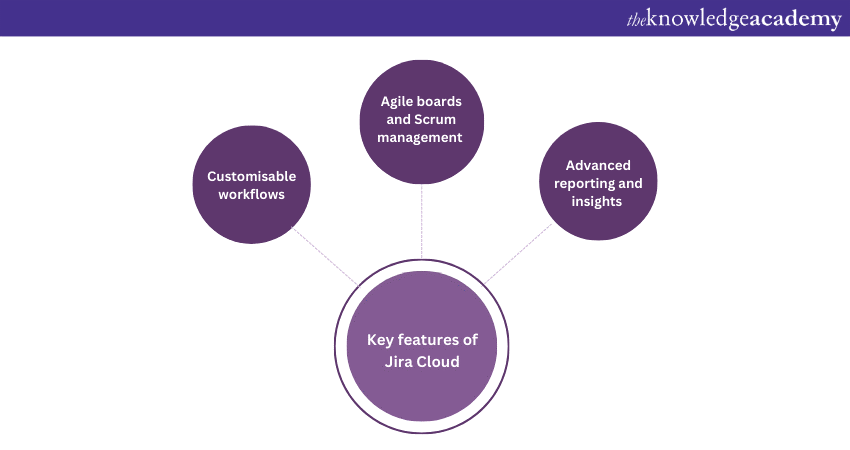We may not have the course you’re looking for. If you enquire or give us a call on +55 8000201623 and speak to our training experts, we may still be able to help with your training requirements.
We ensure quality, budget-alignment, and timely delivery by our expert instructors.

Efficient Project Management is the cornerstone of success for any organisation. Teams need tools to keep up with their ever-evolving needs and streamline their workflows. Jira Cloud is a powerful Project Management tool that helps teams plan, track, and manage their work efficiently. Offering numerous features and functionalities, it helps streamlines tasks, facilitates collaboration, and enhances productivity. Read this blog to learn what Jira Cloud is, its key features, and how to leverage it to improve productivity and collaboration within your team.
Table of Contents
1) What is Jira Cloud?
2) Getting started with Jira Cloud
3) Key features of Jira Cloud
4) Conclusion
What is Jira Cloud?
Jira Cloud is a cloud-based version of the popular Jira software. It is a comprehensive Project Management tool designed to empower teams to collaborate, plan, and execute projects seamlessly. It provides a robust platform where teams can centralise their work, communicate effectively, and stay focused on achieving their goals.
With the rising complexities of modern projects, the traditional manual approach to Project Management have become inefficient and error prone. Jira Cloud addresses these challenges by offering a powerful and user-friendly platform that optimises project workflows, promotes collaboration, and provides valuable insights.

Getting started with Jira Cloud

To begin your journey with Jira Cloud, you will first need to sign up for an account. Open your web browser and navigate to the official Jira Cloud website. You can easily find it through a quick search engine query. Once you are on the website's homepage, look for the "Sign Up" or "Get Started" button. Click on it to begin the registration process. After this, follow these steps:
a) Provide e-mail address: You will be prompted to enter your email address. Make sure to use a valid email that you have access to, as Jira will send a verification link to this address.
b) Create a strong password: Choose a strong and secure password for your Jira Cloud account. Make sure it includes a mix of uppercase and lowercase letters, numbers, and special characters.
c) Confirm e-mail: After submitting your email, go to your inbox and check for an email from Jira Cloud. Click on the verification link provided in the email to confirm your account.
d) Choose a subdomain: Jira Cloud allows you to pick a subdomain for your account, which will be part of your unique Jira URL. Select a subdomain that is relevant to your team or organisation.
e) Provide information: Next, you will be asked to provide some basic information about yourself or your organisation. This may include your name, company name, and job title.
f) Set up the first project: Once your account is set up, you will be taken to the Jira Cloud dashboard. To get started with your first project, click on the "Create" button and choose "Project" from the dropdown menu.
g) Select project type: Jira Cloud offers various project templates based on different use cases, such as software development, project management, or content creation. Choose the template that best suits your team's needs.
h) Name the project: Give your project a descriptive name that reflects its purpose. This will make it easier to identify and manage multiple projects in the future.
i) Invite team members: Collaboration is key to success in Jira Cloud. Invite your team members by entering their email addresses, and they will receive an invitation to join the project.
j) Set project permissions: As the project owner or administrator, you have the option to set specific permissions for each team member. This ensures that everyone has the appropriate level of access to the project's features and information.
k) Customise project: Jira Cloud allows you to customise your project's workflow, issue types, and fields according to your team's specific requirements. Take some time to configure these settings to match your workflow, including how you handle tasks like Raising a Bug in Jira.
l) Start creating issues: With everything set up, it's time to start creating issues for your project. Issues can represent tasks, bugs, new features, or any other work items that need to be addressed.
Learn Project Management with our Introduction To Project Management Certification Course. Join today!
Key features of Jira Cloud
One of the standout features of Jira Cloud is its ability to adapt to your team's unique workflow. With a highly customisable interface, you can create, edit, and automate workflows that align with your project's specific requirements. Whether you follow an agile methodology or a more traditional approach, Jira Cloud can be tailored to fit seamlessly into your existing processes.
For agile enthusiasts, Jira Cloud offers a range of agile boards that make project planning and execution a breeze. Scrum boards, in particular, enable you to organise and prioritise tasks, set sprint goals, and monitor progress in real-time. The intuitive drag-and-drop interface allows for easy task management and fosters collaboration among team members.
Jira Cloud also provides reporting and analytical tools to gain deep insights into your team's performance. From burndown charts to velocity reports, you can track progress, identify bottlenecks, and make data-driven decisions. These comprehensive insights enable you to continuously improve your team's efficiency and deliver projects on time.
Learn how to use Jira with our Jira Masterclass course. Register now!
Conclusion
Jira Cloud is more than just a Project Management tool; it is a catalyst for success. By embracing its flexible workflows and data-driven insights, teams can optimize their overall project processes and achieve remarkable results. With the addition of resources like the Jira ebook, seamless collaboration, effective communication, and a commitment to continuous improvement can further amplify the impact of Jira Cloud on your projects.
Join our Project Management for Non-Project Managers course and gain valuable insights into managing projects, collaborating with teams, and delivering successful outcomes.
Upcoming Project Management Resources Batches & Dates
Date
 Jira Training
Jira Training
Fri 13th Jun 2025
Fri 8th Aug 2025
Fri 26th Sep 2025
Fri 23rd Jan 2026
Fri 20th Mar 2026
Fri 8th May 2026
Fri 10th Jul 2026
Fri 6th Nov 2026






 Top Rated Course
Top Rated Course


 If you wish to make any changes to your course, please
If you wish to make any changes to your course, please


